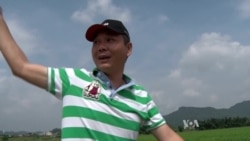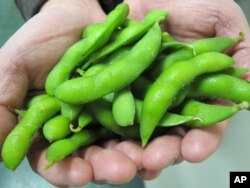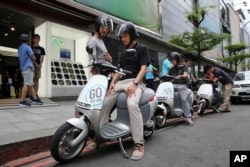China’s economy is like a business magnet and as its influence grows its neighbors are finding it increasingly difficult to remain competitive. Like many economies in the region, Taiwan has been hit hard in recent years as China’s so-called “red-supply chain” has drained off talent and opportunities.
But some entrepreneurs, such as edamame farmer Hou Chau-pai are finding ways to carve out niche markets and thrive.
For decades, Hou’s family has been growing edamame or hairy green soybeans in southern Taiwan. For most of that time, Taiwanese farmers were reaping the lion’s share of exports to Japan, a major consumer of the tasty bean.
But the rise of production in China in the 1990s and early 2000s, cut Taiwan’s exports to Japan nearly in half and almost wiped out cultivation of the crop. At least until farmers such as Hou began switching to machinery to boost yields and looked for ways to revitalize the crop. Persistent government efforts to help create new varieties of the soybean tailored to the Japanese market also played a key role. Taiwan has developed 12 varieties of the bean.
Blind spot
Hou said it is difficult to compete with China, but it has a blind spot.
“Many in China think that just because China is a big country all it has to do is meet domestic demand,” Hou said. “Less thought is given to opening up new channels or markets, or improving the quality of products because few see agriculture as an investment opportunity in China.”
Hou travels to China several times a year to keep an eye on the competition, and when he goes there he said he does not see farmers who are involved in production of the bean, but investors who very quickly would drop the crop for more lucrative endeavors.
That and the demand of China’s domestic market will help Taiwan maintain the upper hand, but that will not last forever, he adds.
What has been key then and is just as important now, is innovation and the willingness to evolve, said Chou Kuo-lung, who heads the crop improvement section at a government agricultural station in Kaohsiung.
“We’re not afraid of competing with China. What we’re afraid of the most is that we don’t progress and get stuck in a rut,” Chou said.
In addition to selling beans to Japan, Hou has also begun experimenting with store fronts selling soybean bread, edamame soymilk and other healthy bean products.
Challenges
But while the picture may be bright for some on a smaller scale, in many ways, Taiwan’s economy is facing serious structural challenges.
“There is a lack of foreign direct investment coming to Taiwan and also very weak linkage to multinational corporations,” said Liang Kuo-yuan, chairman and president of Yuanta-Polaris Research Institute.
As China’s research and development capability is getting increasingly stronger, so is the quality of its institutions of higher learning. In January, Taiwan will elect its next president and getting the economy right is one of the top concerns.
“Without a strong economy, Taiwan will not be recognizable, will not be visible in the world,” Liang said.
One key way that Taiwan can make sure that continues is by putting more emphasis on information and communication technology and shifting its focus to what is called "The Internet of Things", an emerging market the Mckinsey Global Institute estimates could be worth as much as $11 trillion in 10 years.
The Internet of Things is a term that refers the connectivity of sensor packed machines that are connected to the web, such as home heating and security systems. But to do that would mean boosting Taiwan’s capability in software, Liang said.
“Taiwan’s niche [markets] should be concentrated on those products with small volume, but diversified and [those that are] customizable,” he said.
High tech
Agriculture is not the only sector in which firms are using innovation to create niche markets and avoid highly standardized products, an area where China has the upper hand.
One example is Gogoro, an electric smart scooter. The bike taps Taiwan’s manufacturing prowess and high-tech know-how.
Unlike most electric scooters, its batteries can be exchanged at charging stations. The bike’s front is customizable as are all of the bike’s display features, which can be controlled by a smartphone app.
Through the technology it has on board, the bike can help understand how people consume and use energy. Local Taiwan governments are offering subsidies to purchase the bikes.
Company executives have said they hope to eventually market the idea overseas. Even before the bike went on sale the company told media in Taiwan it had been approached by more than 200 cities interested in the idea.







